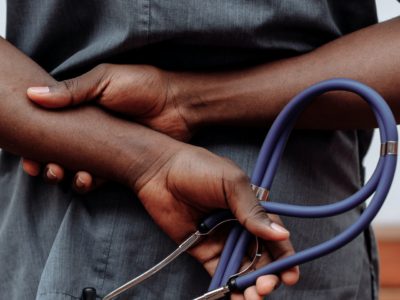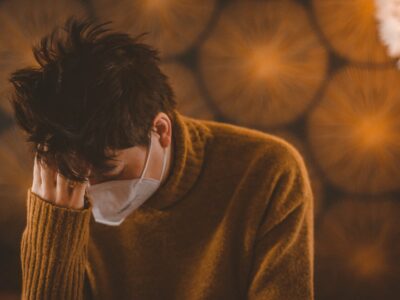More than 800,000 Americans have died of COVID-19, but most of these moments played out behind closed doors in hospital rooms, nursing homes, and private residences. Many nurses say they have seen truly shocking moments over the course of the pandemic, but these images were largely kept out of the public eye – until now.
Photographer Alan Hawes has been capturing these behind-the-scenes moments at the hospital where he works as a registered nurse. He recently unveiled the series to show the world what it has been like to care for coronavirus patients.
Changing Careers
Hawes had seen it all as a professional photographer, Bruce Springsteen in concert, a Civil War submarine being lifted out of the harbor, and NFL playoff games from the sidelines. But he always found himself drawn to the smaller moments that happen after the picture is taken.
“One of my life goals was to make an impact on the world through my career. And for a long time, I felt like I was doing that with photojournalism,” Hawes said.
But everything changed when he went on assignment at a local hospital.
“I saw these life-changing things happening in front of me,” he said. “As a photographer, you’re an observer – and it’s an important job, being that messenger – but seeing those people work, the way they cared for the patients, the difference they could make, I felt like it was time to be a participant.”
And just like that Hawes enrolled in a human physiology night course. He was initially interested in the human body, but he soon found himself on track to becoming a nurse.
“I know this sounds weird, but I felt like I had a gift for understanding how the human body works,” he said. “Then I was in it.”
In 2011, he finally got his first job as a nurse at Summerville Medical Center. A short while later, he enlisted with Medical University of South Carolina in Charleston where he’s worked ever since. Throughout the pandemic, he’s been treating some of the sickest COVID-19 patients.
“Once I made it to the ICU, I knew I was in the right place,” he said. When he was a photographer, he would often listen to the police scanner and head towards the action. He found himself doing the same thing in healthcare even as the pandemic upended the industry.
“I knew I was going into the belly of the beast in that unit, but that’s what I like to do,” he said. “It was super exciting but terrifying. But that was where the news was. I will always have that news bug in me. To experience up close what the rest of the world doesn’t normally get to. I had a front-row seat.”
Capturing Providers in Action
As the crisis continued, Hawes reached out to hospital management to see if he could start recording some of these moments with his camera. The administrators eventually approved his request while making sure he was complying with patient privacy laws.
“Honestly, as I was walking toward the building on the first day in the COVID unit, I knew how good a story this would be to cover as a photographer,” he said.
The task of documenting the pandemic proved challenging but meaningful.
He wasn’t sure what he was capturing as the crisis unfolded but he knew it was important to get it on camera. Some images show patients taking their last breath while others show staff dealing with burnout and fatigue. He says the pictures show humanity at its best and worst.
Like many nurses, he was frustrated with unvaccinated patients that eventually wound up in the ICU, but he also used his camera to humanize them.
“It’s part of being a good nurse is having empathy,” he said. “Once you hear the stories of some of our patients from their family members, you can become a fan of that person and you just know that they’ve made a bad decision.”
He also used the project to highlight all the accomplishments of his team.
“I am really proud of my team, and I wanted people to see how hard they work, how much they care,” Hawes said. “But truly, I just wanted people to know that the people in here, these ones that are really sick, a lot of them are just regular people who weren’t vaccinated. And they’re dying because of it.”
One of the hardest things for him to photograph was patients dying alone in their rooms separated from friends and family.
“You’re standing there, holding an iPad so a dying patient’s family can say goodbye. And the patient isn’t even conscious,” he said. “As a nurse, it’s such a helpless feeling. You need to be there, but on some level, you feel like you shouldn’t – their family should be the ones there. But this virus robs us of so many things. It’s heartbreaking. Hardest thing I’ve ever had to do in my career. I wouldn’t wish it on anybody.”
Despite the horrors of the pandemic, Hawes believes people need to see the truth.
“I will never stop seeing the world as a photographer,” Hawes said. “That guy is still in there, but these days, my heart is on the other side of the camera.”

















